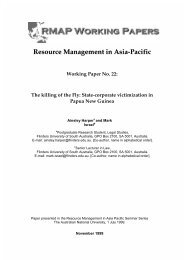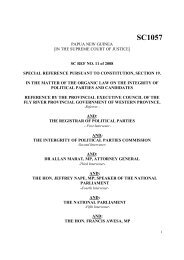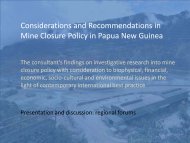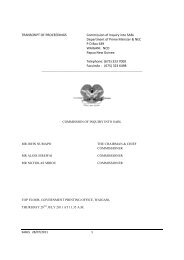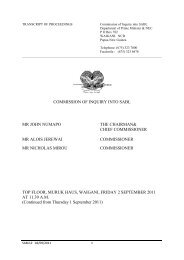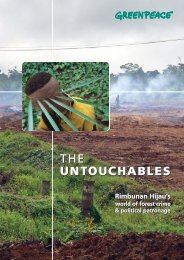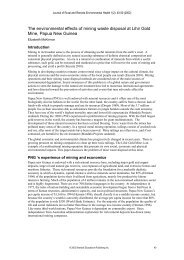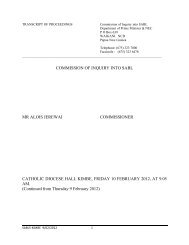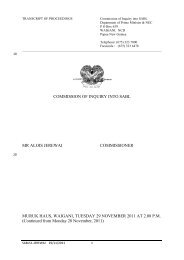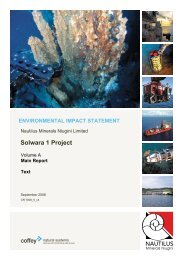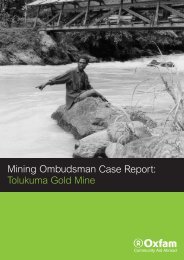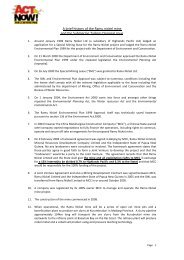Fishy business. The Social Impact of SST.pdf - Act Now!
Fishy business. The Social Impact of SST.pdf - Act Now!
Fishy business. The Social Impact of SST.pdf - Act Now!
Create successful ePaper yourself
Turn your PDF publications into a flip-book with our unique Google optimized e-Paper software.
weakened state <strong>of</strong> labour. This is certainly true in the First World, where capitalism has morefreedom and labour less control. But labour is not just Western anymore, and great blocks <strong>of</strong>workers in the developing world now constitute potentially significant political and social powerbases. Workers on the <strong>SST</strong> production line are part <strong>of</strong> a family <strong>of</strong> <strong>SST</strong> employees operating inseveral countries (Taiwan, the US and PNG, at least) even if they remain ‘mystified’ andscattered and psychologically far drom an ‘imagined community’ (in the sense <strong>of</strong> BenedictAnderson [1991]) <strong>of</strong> educated union members. But it is precisely because they remain unaware <strong>of</strong>this, and exist in a local political context where they enjoy no labour protections, that PNG can bedescribed as an attractive environment for international investment. It’s always good to get inbefore a country’s established firm labour laws. Even better when the economic and political eliteare one and the same. So much the easier.But the Corporate <strong>Social</strong> Responsibility (CSR) movement in the western world has begun to closesome <strong>of</strong> these social loopholes. It begins with Eruopean companies affirming that corporateresponsibility goes beyond financial obligations to shareholders. A number <strong>of</strong> British companies,fore example, have struck up partnerships with NGO’s that lend their ‘brands’ to these companiesin return for social or environmental monitoring. British American Tobacco (BAT), for example,has brought in consultants <strong>of</strong> all kinds to manage ‘stakeholder dialogues’ with health <strong>of</strong>ficials,farmers, <strong>of</strong>fice workers and others in the many developing countires where they operate. <strong>The</strong>seare voluntary dialogues, and clever marketing strategies as well. In part, too, they are attempts t<strong>of</strong>end <strong>of</strong> more invasive government regulations (<strong>of</strong> the sort known to France and Germany, forexample---because only recently have publicly traded companies in the UK been forced todivulge financially material environmental and social risks). <strong>The</strong> questions such voluntarymeasures raise are really that <strong>of</strong> control, and language. Corporate social responsibility is beingdefined by these companies, just as is the term ‘stakeholder’ ---meaning who exactly constitutes astakeholder in an enterprise? (Would Wewak residents suffering from <strong>SST</strong>’s odour be consideredstakeholders, for example?) <strong>The</strong>se processes are now being systematized by major corporations inthis emergency CSR movement. We have only to recall what philosopher Michael Foucault saidabout organization being a form <strong>of</strong> social control to wonder whether this work should be left tothe companies themselves.Again, this is a positive step. But it may also be a dangerous one. In a recent article on the CSRmovement by law pr<strong>of</strong>essor John M. Conley (Conley 2005), ExxonMobil’s 2003 company reportis cited as an example <strong>of</strong> controlling corporate responsibility away in a form <strong>of</strong> Adam Smithspeak.<strong>The</strong> report says, “’Our activities and those <strong>of</strong> others in private industry deliver economicbenefits and help advance worthwhile societal goals.’” As Conley notes, the report goes on toexplain in the rhetoric <strong>of</strong> engineering that ExxonMobil’s “’wider involvement in society’ will begoverned by ’hard analysis, the rigorously applied management systems’ that mark its coreendeavours. ‘S<strong>of</strong>t’ critics need not apply.”This recalls the interview our team had with Ian Boatwood <strong>of</strong> <strong>SST</strong>, who, in response to aquestion about how they give back to town, said simply,Well, we employ a lot <strong>of</strong> people. A tuna factory like this, there are multipliers out there. Wedo half a million plus <strong>business</strong> in town, we generate all our own power here, we don’t usethe town supply…we are using water for the town supply, though. We throw revenues backto the Water Board and wages going out into the <strong>business</strong> communities, we inject moneyinto the community, we get involved in some sponsorships.166



